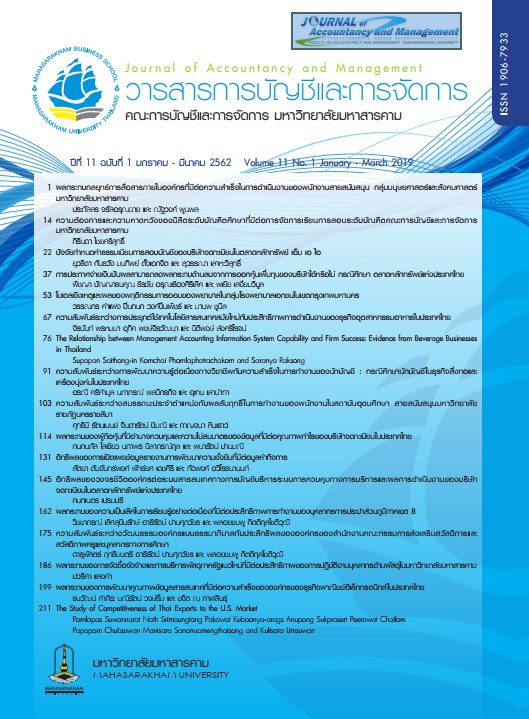Influence of Organizational Life-Cycle on Management Accounting Information System, Management Control System and Performance of the Listed Companies in Thailand
Keywords:
วงจรชีวิตองค์กร รูปแบบระบบสารสนเทศทางการบัญชีบริหาร รูปแบบระบบควบคุมทางการบริหาร ผลการปฏิบัติงานทางบริหาร ผลการดำเนินงานขององค์กรAbstract
งานวิจัยนี้มีวัตถุประสงค์เพื่อศึกษาผลกระทบของวงจรชีวิตองค์กรที่มีต่อรูปแบบระบบสารสนเทศทาง
การบัญชีบริหาร รูปแบบระบบควบคุมทางการบริหาร และผลการดำเนินงานขององค์กร รวมถึงเพื่อศึกษาความสัมพันธ์ระหว่างรูปแบบระบบสารสนเทศทางการบัญชีบริหารกับผลการปฏิบัติงานทางบริหาร และเพื่อตรวจสอบอิทธิพลของรูปแบบระบบควบคุมทางการบริหารและผลการปฏิบัติงานทางบริหารที่มีต่อผลการดำเนินงานขององค์กร ประชากร
ในการศึกษาคือบริษัทจดทะเบียนในตลาดหลักทรัพย์แห่งประเทศไทย เก็บรวบรวมข้อมูลปฐมภูมิโดยใช้แบบสอบถาม และเก็บข้อมูลทุติยภูมิจากรายงานประจำปีของบริษัท สถิติที่ใช้เพื่อการวิเคราะห์ข้อมูล ประกอบด้วย การวิเคราะห์ความแปรปรวนพหุคูณ (MANOVA) และการวิเคราะห์ความถดถอย (Regression Analysis) ผลการวิเคราะห์ข้อมูลพบว่าวงจรชีวิตขององค์กรที่ต่างกันจะมีผลการดำเนินงานขององค์กรแตกต่างกันด้วย รูปแบบสารสนเทศทางการบัญชีบริหารที่มีขอบเขตกว้าง (มีการนำเสนอข้อมูลทางการเงินและข้อมูลอื่นที่ไม่ใช่ข้อมูลทางการเงินประกอบด้วย ข้อมูลอดีต ข้อมูลอนาคตที่คาดการณ์บนพื้นฐานของข้อมูลอดีต และข้อมูลอนาคตที่ทำขึ้นภายใต้การคาดการณ์การเปลี่ยนแปลงของสภาพแวดล้อมภายนอกองค์กร) มีการนำเสนอข้อมูลตามระยะเวลาสม่ำเสมอและค่อนข้างถี่ ทันต่อเวลาให้
การวิเคราะห์ข้อมูลร่วมด้วย รวมถึงการรายงานข้อมูลที่มีความเชื่อมโยงกันของหน่วยงานย่อยที่มีความเกี่ยวข้องและประสานงานกันไว้ในรายงานชุดเดียวกัน ส่งผลให้การปฏิบัติงานทางบริหารมีระดับความสำเร็จสูงขึ้นด้วย นอกจากนี้ พบว่าผลการปฏิบัติงานทางการบริหารที่สูงขึ้นส่งผลให้ผลการดำเนินงานขององค์กรสูงขึ้นด้วย
References
ระบบสารสนเทศทางการบัญชีที่มีต่อความสำเร็จในการปฏิบัติงานด้านบัญชีของธุรกิจเหล็กและเหล็กกล้าในประเทศไทย.
วารสารการบัญชีและการจัดการ มหาวิทยาลัยมหาสารคาม, 9(2), 114-124.
ณัฐณิชา ฉัตรสุวรรณ, ศรีรุ่งรัตน์ สุดสมบูรณ์ และ ขจิต ก้อนทอง. (2560) ผลกระทบของการบูรณาการระบบสารสนเทศทางการ
บัญชีที่เป็นเลิศที่มีต่อประสิทธิภาพการบริหารเชิงกลยุทธ์ของธุรกิจเครื่องใช้ไฟฟ้าและอิเล็กทรอนิกส์ในประเทศไทย.
วารสารการบัญชีและการจัดการ มหาวิทยาลัยมหาสารคาม, 91(2), 135-145.
Agbejule, A. & Saarikoski, L. (2006). The Effect of Cost Management Knowledge on the Relationship between
Budgetary Participation and Managerial Performance. The British Accounting Review, 38(4), 427-440.
Auzair, S. Md. & Langfield-Smith, K. (2005). The Effect of Service Process Type, Business Strategy and Life Cycle
Stage on Bureaucratic MCS in Service Organizations. Management Accounting Research, 16, 399-421.
Brito L. A. L. & Sauan P. K. (2016). Management Practices as Capabilities Leading to Superior Performance.
Brazilian Administration Review, 13, Retrieved Dec 20, 2016,
from http://dx.doi.org/10.1590/1807-7692bar2016160004.
Cassia L., Paleari S., & Redondi R. (2005). Management Accounting Systems and Organisational Structure.
Small Business Economics, 25, 373-391.
Chenhall, R. H. (2005). Management Control Systems Design within Its Organizational Context: Findings from
Contingency-Base Research and Directions for the Future. Accounting, Organization and Society, 28, 127-168.
Choe, J. (2004). The Relationships among Management Accounting Information, Organizational Learning and
Production Performance. Journal of Strategic Information Systems, 13, 61-85.
Chong, V. K. & Eggleton, I. R. C. (2003). The Decision-Facilitating Role of Management Accounting Systems on
Managerial Performance: The Influence of Locus of Control and Task Uncertainty. Advances in Accounting,
20, 165-197.
Chow, C. W., Shields, M. D., & Wu, A. (1999). The Importance of National Culture in the Design and Preference for
Management Controls for Multi-National Operations. Accounting, Organizations and Society, 24, 441-461.
Duréndez A., Ruíz-Palomo D., García-Pérez-de-Lema D., & Diéguez-Soto J. (2016). Management Control Systems
and Performance in Small and Medium Family Firms. European Journal of Family Business, 6, 10-20.
Etemadi, H., Dilami, Z.D., Bazaz, M.S. & Parmeswaran, R. (2009). Culture, Management Accounting and Managerial
Performance: Focus Iran. Advances in Accounting, Incorporating Advances in International Accounting, 25,
216-225.
Fisher, J. (1995). Contingency-Base Research on Management Control Systems: Categorization by Level of
Complexity. Journal of Accounting Literature, 14, 24-53.
Fredericks, E. (2005). Infusing Flexibility into Business-to-Business Firms: A Contingency Theory and Resource-Base
View Perspective and Practical Implications. Industrial Marketing Management, 34, 555-565.
Friebel G. & Helena Schweiger H. (2012). Management Quality, Firm Performance and Market Pressure in Russia.
European Bank for Reconstruction and Development. Retrieved June 24, 2018, from
https://www.ebrd.com/downloads/research/economics/workingpapers/wp0144.pdf.
Gerdin, J. (2005). Management Accounting System Design in Manufacturing Departments: an Empirical Investigation
Using a Multiple Contingencies Approach. Accounting, Organizations and Society, 30, 99-126.
Gong, M. Z. & Tse, M. S. C. (2009). Pic, Mix or Match? A Discussion of Theories for Management Accounting
Research. Journal of Accounting-Business and Management, 16(2), 54-66.
Kallunki, J. & Silvola, H. (2008). The Effect of Organizational Life Cycle Stage on the Use of Activity-Based Costing.
Management Accounting Research, 19, 62-79.
Kallunki J., Laitine E. K., & Silvola, H. (2011). Impact of Enterprise Resource Planning Systems on Management
Control Systems and Firm Performance. International Journal of Accounting Information Systems, 12, 20-39.
Miller, D. & Friesen, P. H. (1983). Successful and Unsuccessful Phases of the Corporate Life Cycle. Organization
studies, 4(4), 339-356.
Miller, D. & Friesen, P. H. (1984). A Longitudinal Study of the Corporate Life Cycle. Management Science, 30(10),
1161-1183.
Mithas S., Ramasubbu N., & Sambamurthy V. (2011). How Information Management Capability Influences Firm
Performance. MIS Quarterly, 35(1), 237-256.
Moores, K. & Yuen, S. (2001). Management Accounting Systems and Organizational Configuration: a Life-Cycle
Perspective. Accounting, Organizations and Society, 26, 351-389.
Morgan, N. A. (2012). Marketing and Business Performance. Journal of the Academic Marketing Science, 40,
102-119.
Naranjo-Gil, D. (2009). Management Information Systems and Strategic Performances: The Role of Top Team
Composition. International Journal of Information Management, 29, 104-110.
Parker, C. S. & Case T. (1993). Management Information System: Strategy and action. Singapore, McGrawHil.
Sharma, R., Jones, S., & Ratnatunga, J. (2006). The Relationships among Broad scope MAS, Managerial Control,
Performance, and Job Relevant Information A Concomitant Analysis. Review of Accounting and Finance,
5(3), 228-250.
Silvola, H. (2008). Do Organizational Life-Cycle and Venture Capital Investors Affect the Management Control System
Used by the Firm?. Advances in Accounting, Incorporating Advances in International Accounting, 24, 128-138.
Soobaroyen, T. & Poorundersing, B. (2008). The Effectiveness of Management Accounting Systems Evidence from
Functional Manager in a Developing Country. Managerial Auditing Journal, 23(2), 187-219.
Tillema, S. (2005). Towards and Integrated Contingency Framework for MAS Sophistication Case Studies on the
Scope of Accounting Instruments in Dutch Power and Gas Companies. Management Accounting Research,
16, 101-129.
Tsui, J. S. L. (2001). The Impact of Culture on the relationship between Budgetary Participation, Management
Accounting System, and Managerial Performance: an Analysis of Chinese and Western Managers.
The International Journal of Accounting, 36, 125-146.
Wang, G. & Singh, P. (2014). The Evolution of CEO Compensation over the Organization Life Cycle: A Contingency
Explanation. Human Resource Management Review, 24, 144-159.
Williams, C. and Triest, S. (2009). The Impact of Corporate and National Cultures on Decentralization in Multinational
Corporations. International Business Review, 18, 156-167.
Van der Stede, W. A. (2003). The Effect of National Culture on Management Control and Incentive System Design in
Multi-Business Firms: Evidence of Intracorporate Isomorphism. European Accounting Review, 12(2), 263-285.
Yarbrough, L., Morgan, N. A., & Vorhies, D. W. (2011). The Impact of Product Market Strategy-Organizational Culture
Fit on Business Performance. Journal of the Academic Marketing Science, 39, 555-573.
Downloads
Published
How to Cite
Issue
Section
License
บทความที่ได้รับการตีพิมพ์เป็นลิขสิทธิ์ของวารสารการบัญชีและการจัดการ
ข้อความที่ปรากฏในบทความแต่ละเรื่องในวารสารวิชาการเล่มนี้เป็นความคิดเห็นส่วนตัวของผู้เขียนแต่ละท่านไม่เกี่ยวข้องกับมหาวิทยาลัยมหาสารคาม และคณาจารย์ท่านอื่นๆในมหาวิทยาลัยฯ แต่อย่างใด ความรับผิดชอบองค์ประกอบทั้งหมดของบทความแต่ละเรื่องเป็นของผู้เขียนแต่ละท่าน หากมีความผิดพลาดใดๆ ผู้เขียนแต่ละท่านจะรับผิดชอบบทความของตนเองแต่ผู้เดียว



